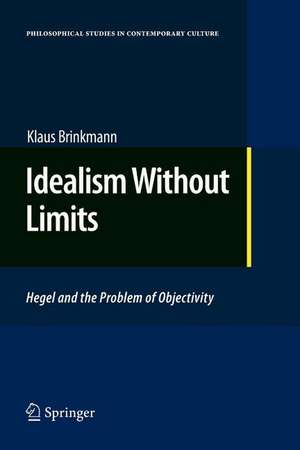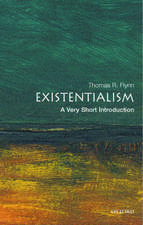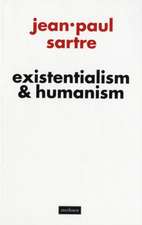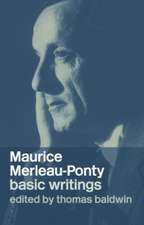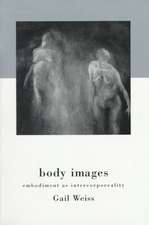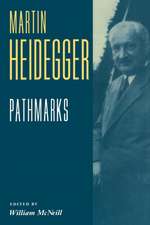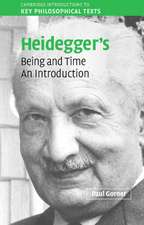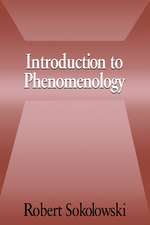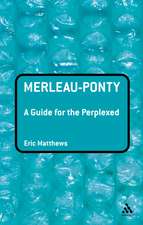Idealism Without Limits: Hegel and the Problem of Objectivity: Philosophical Studies in Contemporary Culture, cartea 18
Autor Klaus Brinkmannen Limba Engleză Paperback – dec 2012
Brinkmann's book is a remarkable achievement. He has given us what may be the definitive version of the transcendental, categorial interpretation of Hegel. He does this in a clear approachable style punctuated with a dry wit, and he fearlessly takes on the arguments and texts that are the most problematic for this interpretation. Throughout the book, he situates Hegel firmly in his own context and that of contemporary discussion." -Terry P. Pinkard, University Professor, Georgetown University, Washington, D.C, USA"Klaus Brinkmann’s important Hegel study reads the Phenomenology and the Logic as aspects of a single sustained effort, in turning from categories to concepts, to carry Kant’s Copernican turn beyond the critical philosophy in what constitutes a major challenge to contemporary Cartesianism."- Tom Rockmore, McAnulty College Distinguished Professor, Duquesne University, Pittsburgh, Pennsylvania, USA"In this compelling reconstruction of the theme of objective thought, Klaus Brinkmann takes the reader through Hegel’s dialectic with exceptional philosophical acumen.... Many aspects of this book are striking: the complete mastery of the central tenets of Kant’s and Hegel’s philosophy, the admirable clarity in treating obscure texts and very difficult problems, and how Brinkmann uses his expertise for a discussion of the problems of truth, objectivity and normativity relevant to the contemporary philosophical debate. This will prove to be a very important book, one that every serious student of Kant and Hegel will have to read."- Alfredo Ferrarin, Professor, Department of Philosophy, University of Pisa, Pisa, Italy
| Toate formatele și edițiile | Preț | Express |
|---|---|---|
| Paperback (1) | 640.55 lei 6-8 săpt. | |
| SPRINGER NETHERLANDS – dec 2012 | 640.55 lei 6-8 săpt. | |
| Hardback (1) | 646.75 lei 6-8 săpt. | |
| SPRINGER NETHERLANDS – 31 oct 2010 | 646.75 lei 6-8 săpt. |
Din seria Philosophical Studies in Contemporary Culture
- 15%
 Preț: 641.38 lei
Preț: 641.38 lei -
 Preț: 390.08 lei
Preț: 390.08 lei -
 Preț: 383.93 lei
Preț: 383.93 lei - 15%
 Preț: 643.34 lei
Preț: 643.34 lei - 18%
 Preț: 950.96 lei
Preț: 950.96 lei - 15%
 Preț: 640.55 lei
Preț: 640.55 lei - 15%
 Preț: 643.84 lei
Preț: 643.84 lei - 15%
 Preț: 634.18 lei
Preț: 634.18 lei - 15%
 Preț: 645.60 lei
Preț: 645.60 lei - 20%
 Preț: 558.87 lei
Preț: 558.87 lei - 15%
 Preț: 641.03 lei
Preț: 641.03 lei - 15%
 Preț: 647.08 lei
Preț: 647.08 lei -
 Preț: 387.96 lei
Preț: 387.96 lei - 20%
 Preț: 570.73 lei
Preț: 570.73 lei - 15%
 Preț: 589.97 lei
Preț: 589.97 lei -
 Preț: 387.96 lei
Preț: 387.96 lei - 18%
 Preț: 777.50 lei
Preț: 777.50 lei - 15%
 Preț: 703.06 lei
Preț: 703.06 lei - 15%
 Preț: 643.48 lei
Preț: 643.48 lei - 18%
 Preț: 1237.14 lei
Preț: 1237.14 lei - 18%
 Preț: 953.82 lei
Preț: 953.82 lei - 18%
 Preț: 1114.83 lei
Preț: 1114.83 lei - 15%
 Preț: 635.47 lei
Preț: 635.47 lei - 15%
 Preț: 635.65 lei
Preț: 635.65 lei - 15%
 Preț: 642.68 lei
Preț: 642.68 lei
Preț: 640.55 lei
Preț vechi: 753.60 lei
-15% Nou
Puncte Express: 961
Preț estimativ în valută:
122.57€ • 131.07$ • 102.20£
122.57€ • 131.07$ • 102.20£
Carte tipărită la comandă
Livrare economică 17 aprilie-01 mai
Preluare comenzi: 021 569.72.76
Specificații
ISBN-13: 9789400733947
ISBN-10: 9400733941
Pagini: 300
Ilustrații: XIV, 286 p.
Dimensiuni: 155 x 235 x 16 mm
Greutate: 0.42 kg
Ediția:2011
Editura: SPRINGER NETHERLANDS
Colecția Springer
Seria Philosophical Studies in Contemporary Culture
Locul publicării:Dordrecht, Netherlands
ISBN-10: 9400733941
Pagini: 300
Ilustrații: XIV, 286 p.
Dimensiuni: 155 x 235 x 16 mm
Greutate: 0.42 kg
Ediția:2011
Editura: SPRINGER NETHERLANDS
Colecția Springer
Seria Philosophical Studies in Contemporary Culture
Locul publicării:Dordrecht, Netherlands
Public țintă
ResearchCuprins
PrefaceIntroductionChapter One: The Problem of Objectivity: A Problem of Modernity1.1 The Objectivity Problem and the Crisis of Subjectivity 1.2 Descartes and the Roots of the Crisis 1.3 Some Traditional Arguments in Defense of Objectivity 1.4 Contemporary Defenses of Objectivity 1.5 Conclusions Chapter Two: The Problem of Objectivity: Kant2.1 Kant’s Transcendental Idealism 2.2 Hegel’s Critique of Kant: The Transcendental Deduction 2.3 Beyond the Matter-Form Distinction: Hegel as a Philosopher of Radical Immanence Chapter Three: The Argument of the Phenomenology3.1 Methodological Presuppositions 3.2 Sense-Certainty: The Particular and the Universal 3.3 Perception and Understanding: The Immanence of Thinking and the Meaning of Aufhebung 3.4 The Native Land of Truth: From Desire to Reason 3.5 Methodological Interlude: Overcoming the Opposition of Consciousness 3.6 The Internalization of Spirit: From the Ethical Substance to the Spiritual Individual3.7 Spirit That Knows Itself as Spirit: Religion and Absolute Knowing Chapter Four: Objective Knowledge and the Logic4.1 Interlude: Does the System Need a Ladder? 4.2 Hegel’s Paradigm Shift: From Referentiality to Intelligibility of Thought 4.3 The Metaphysical and the Non-Metaphysical Hegel4.4 Hegel’s Integrative Pluralism and Its LimitsBibliography Index
Recenzii
From the reviews:
"Brinkmann's book is a remarkable achievement. He has given us what may be the definitive version of the transcendental, categorial interpretation of Hegel. He does this in a clear approachable style punctuated with a dry wit, and he fearlessly takes on the arguments and texts that are the most problematic for this interpretation. Throughout the book, he situates Hegel firmly in his own context and that of contemporary discussion." -Terry P. Pinkard, University Professor, Georgetown University, Washington, D.C, USA
"Klaus Brinkmann’s important Hegel study reads the Phenomenology and the Logic as aspects of a single sustained effort, in turning from categories to concepts, to carry Kant’s Copernican turn beyond the critical philosophy in what constitutes a major challenge to contemporary Cartesianism." - Tom Rockmore, McAnulty College Distinguished Professor, Duquesne University, Pittsburgh, Pennsylvania, USA
"In this compelling reconstruction of the theme of objective thought, Klaus Brinkmann takes the reader through Hegel’s dialectic with exceptional philosophical acumen.... Many aspects of this book are striking: the complete mastery of the central tenets of Kant’s and Hegel’s philosophy, the admirable clarity in treating obscure texts and very difficult problems, and how Brinkmann uses his expertise for a discussion of the problems of truth, objectivity and normativity relevant to the contemporary philosophical debate. This will prove to be a very important book, one that every serious student of Kant and Hegel will have to read." - Alfredo Ferrarin, Professor, Department of Philosophy, University of Pisa, Pisa, Italy
“Brinkmann’s book aims to assess the problem of securing universal and necessary truth and knowledge for self-conscious cognitive subjects, focusing primarily on Hegel’s approach … to establishing non-relative objectivity and normative principles of cognition andaction. … Kant’s assessment of Descartes’ position in the ‘Refutation’ would have substantially articulated and enriched our comprehension of the theoretical relationship between Descartes and Kant and of its proper role within the economy of Brinkmann’s book.” (Cinzia Ferrini, Philosophy in Review, Vol. XXXI (3), 2011)
"Brinkmann's book is a remarkable achievement. He has given us what may be the definitive version of the transcendental, categorial interpretation of Hegel. He does this in a clear approachable style punctuated with a dry wit, and he fearlessly takes on the arguments and texts that are the most problematic for this interpretation. Throughout the book, he situates Hegel firmly in his own context and that of contemporary discussion." -Terry P. Pinkard, University Professor, Georgetown University, Washington, D.C, USA
"Klaus Brinkmann’s important Hegel study reads the Phenomenology and the Logic as aspects of a single sustained effort, in turning from categories to concepts, to carry Kant’s Copernican turn beyond the critical philosophy in what constitutes a major challenge to contemporary Cartesianism." - Tom Rockmore, McAnulty College Distinguished Professor, Duquesne University, Pittsburgh, Pennsylvania, USA
"In this compelling reconstruction of the theme of objective thought, Klaus Brinkmann takes the reader through Hegel’s dialectic with exceptional philosophical acumen.... Many aspects of this book are striking: the complete mastery of the central tenets of Kant’s and Hegel’s philosophy, the admirable clarity in treating obscure texts and very difficult problems, and how Brinkmann uses his expertise for a discussion of the problems of truth, objectivity and normativity relevant to the contemporary philosophical debate. This will prove to be a very important book, one that every serious student of Kant and Hegel will have to read." - Alfredo Ferrarin, Professor, Department of Philosophy, University of Pisa, Pisa, Italy
“Brinkmann’s book aims to assess the problem of securing universal and necessary truth and knowledge for self-conscious cognitive subjects, focusing primarily on Hegel’s approach … to establishing non-relative objectivity and normative principles of cognition andaction. … Kant’s assessment of Descartes’ position in the ‘Refutation’ would have substantially articulated and enriched our comprehension of the theoretical relationship between Descartes and Kant and of its proper role within the economy of Brinkmann’s book.” (Cinzia Ferrini, Philosophy in Review, Vol. XXXI (3), 2011)
Textul de pe ultima copertă
In this study of Hegel's philosophy, Brinkmann undertakes to defend Hegel's claim to objective knowledge by bringing out the transcendental strategy underlying Hegel's argument in the Phenomenology of Spirit and the Logic. Hegel's metaphysical commitments are shown to become moot through this transcendental reading. Starting with a survey of current debates about the possibility of objective knowledge, the book next turns to the original formulation of the transcendental argument in favor of a priori knowledge in Kant's First Critique. Through a close reading of Kant's Transcendental Deduction and Hegel's critique of it, Brinkmann tries to show that Hegel develops an immanent critique of Kant's position that informs his reformulation of the transcendental project in the Introduction to the Phenomenology of Spirit and the formulation of the position of 'objective thought' in the Science of Logic and the Encyclopedia of the Philosophical Sciences. Brinkmann takes the reader through the strategic junctures of the argument of the Phenomenology that establishes the position of objective thinking with which the Logic begins. A critical examination of the Introduction to the Lectures on the History of Philosophy shows that Hegel's metaphysical doctrine of the self-externalization of spirit need not compromise the ontological project of the Logic and thus does not burden the position of objective thought with pre-critical metaphysical claims.
Brinkmann's book is a remarkable achievement. He has given us what may be the definitive version of the transcendental, categorial interpretation of Hegel. He does this in a clear approachable style punctuated with a dry wit, and he fearlessly takes on the arguments and texts that are the most problematic for this interpretation. Throughout the book, he situates Hegel firmly in his own context and that of contemporary discussion." -Terry P. Pinkard, University Professor, Georgetown University, Washington, D.C, USA"Klaus Brinkmann’s important Hegel study reads the Phenomenology and the Logic as aspects of a single sustained effort, in turning from categories to concepts, to carry Kant’s Copernican turn beyond the critical philosophy in what constitutes a major challenge to contemporary Cartesianism."- Tom Rockmore, McAnulty College Distinguished Professor, Duquesne University, Pittsburgh, Pennsylvania, USA"In this compelling reconstruction of the theme of objective thought, Klaus Brinkmann takes the reader through Hegel’s dialectic with exceptional philosophical acumen.... Many aspects of this book are striking: the complete mastery of the central tenets of Kant’s and Hegel’s philosophy, the admirable clarity in treating obscure texts and very difficult problems, and how Brinkmann uses his expertise for a discussion of the problems of truth, objectivity and normativity relevant to the contemporary philosophical debate. This will prove to be a very important book, one that every serious student of Kant and Hegel will have to read."- Alfredo Ferrarin, Professor, Department of Philosophy, University of Pisa, Pisa, Italy
Brinkmann's book is a remarkable achievement. He has given us what may be the definitive version of the transcendental, categorial interpretation of Hegel. He does this in a clear approachable style punctuated with a dry wit, and he fearlessly takes on the arguments and texts that are the most problematic for this interpretation. Throughout the book, he situates Hegel firmly in his own context and that of contemporary discussion." -Terry P. Pinkard, University Professor, Georgetown University, Washington, D.C, USA"Klaus Brinkmann’s important Hegel study reads the Phenomenology and the Logic as aspects of a single sustained effort, in turning from categories to concepts, to carry Kant’s Copernican turn beyond the critical philosophy in what constitutes a major challenge to contemporary Cartesianism."- Tom Rockmore, McAnulty College Distinguished Professor, Duquesne University, Pittsburgh, Pennsylvania, USA"In this compelling reconstruction of the theme of objective thought, Klaus Brinkmann takes the reader through Hegel’s dialectic with exceptional philosophical acumen.... Many aspects of this book are striking: the complete mastery of the central tenets of Kant’s and Hegel’s philosophy, the admirable clarity in treating obscure texts and very difficult problems, and how Brinkmann uses his expertise for a discussion of the problems of truth, objectivity and normativity relevant to the contemporary philosophical debate. This will prove to be a very important book, one that every serious student of Kant and Hegel will have to read."- Alfredo Ferrarin, Professor, Department of Philosophy, University of Pisa, Pisa, Italy
Caracteristici
A creative and scholarly study of Hegel that breaks new ground in appreciating his contribution to transcendental philosophy and his relevance to contemporary discussions of the objectivity problems Shows how Hegel redefines and completes Kant’s Transcendental turn Sheds new light on the internal structure of Kant’s Transcendental Deduction Shows how Hegel’s Phenomenology of Spirit overcomes Kant’s restriction of knowledge, establishes the standpoint of objective cognition
